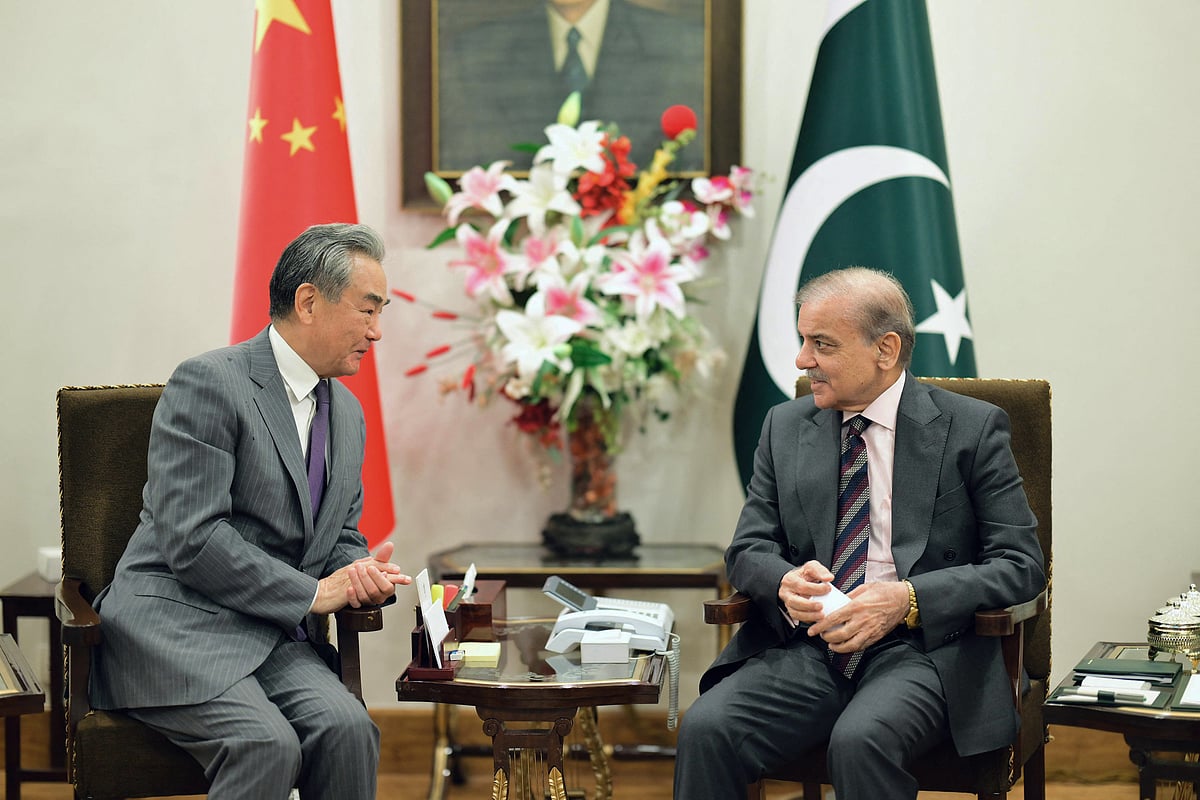China reaffirms ties, but raises the bar for Pakistan
Wang Yi’s visit highlights opportunity, but also Beijing’s stricter financial calculus

The recent visit of Chinese Foreign Minister Wang Yi to Pakistan — following high-profile stops in India and Afghanistan — underscores Beijing’s complex and evolving engagement with South Asia. While his visit to India was strictly bilateral, his meeting in Kabul was part of a strategic trilateral dialogue with Afghanistan and Pakistan, aimed at reviving regional connectivity under the Belt and Road Initiative (BRI) and countering the shared threat of militancy emanating from Afghan soil. Islamabad was the final and arguably most consequential stop, where the future of the China-Pakistan partnership — and particularly the China-Pakistan Economic Corridor (CPEC) — was in focus.
At a joint press conference with Foreign Minister Ishaq Dar in Islamabad, Wang Yi declared that the two countries would prioritise “high-quality” cooperation under CPEC, unveiling plans for what he called an “upgraded version” of the multibillion-dollar CPEC. “We will build on our past achievements to build a growth corridor, a livelihood-enhancing corridor, an innovation corridor, a green corridor, and an open corridor,” Wang said, emphasising synergy with Pakistan’s own development planning.
Deepened cooperation
He announced deepened cooperation in industry, agriculture, and mining — sectors critical for generating sustainable growth in Pakistan’s ailing economy. The Chinese Foreign Minister also reaffirmed support for the development and operation of Gwadar Port, promised an “orderly” promotion of the Karakoram Highway (KKH) realignment, and welcomed third-party participation in the Main Line-1 (ML-1) railway project, an ambitious modernisation of Pakistan’s Karachi–Peshawar line.
For Pakistan, these announcements were music and thus reassuring. With Prime Minister Shehbaz Sharif scheduled to travel to Beijing later this month for the Shanghai Cooperation Organisation (SCO) summit and bilateral talks, many expect the formal unveiling of “CPEC Phase 2” that has languished amid bureaucratic delays, lack of infrastructure readiness, and Islamabad’s struggles to meet its financial commitments — including repayments to Chinese lenders from the first phase.
Pragmatic approach
Despite the effusive language of “all-weather friendship,” Beijing’s approach to Pakistan today is more pragmatic than sentimental. Wang Yi’s praise of Pakistan’s counterterrorism efforts was pointed but not unconditional. Chinese nationals have been repeatedly targeted by militants. Beijing remains deeply concerned about the safety of its personnel and the operational security of its investments. Without robust guarantees, China is unlikely to commit significant new funds.
Moreover, China’s financial calculus has hardened. The days of open-handed lending are over; future investments will likely hinge on strict performance benchmarks, tighter oversight, and mechanisms to ensure repayment. Pakistan’s mounting debt burden and political volatility have made Beijing cautious, even as it continues to see Islamabad as a strategic partner and gateway to the Arabian Sea.
The timing of this renewed push also coincides with Washington’s recent overtures to Pakistan. US officials have recently signalled interest in re-engaging Islamabad on counterterrorism and mineral development. Some observers believe Beijing’s proactive stance — including the promise of “CPEC 2.0” — is partly aimed at ensuring Pakistan does not drift back into Washington’s strategic orbit.
China has long relied on Pakistan as a counterweight to India, where China’s relations are only beginning to thaw. It is no secret that Beijing’s political and military support was critical for Islamabad during its recent skirmishes with India. Keeping Pakistan close serves not just economic, but also geopolitical purposes for China.
Integrated regional network
Islamabad, for its part, is keen to project reliability to its largest investor. Federal Minister for Planning, Development, and Special Initiatives Ahsan Iqbal recently reiterated the government’s commitment to fully utilising Gwadar Port, connecting CPEC to Central Asian markets, and unlocking mineral wealth in and around Gwadar. These ambitions align with China’s vision of an integrated regional economic network, but their realisation hinges on Pakistan’s ability to deliver on security, governance, and fiscal discipline.
The planned “upgraded” CPEC promises much: industrialisation, job creation, and sustainable growth through green and innovation-driven projects. Yet, without concrete reforms and political stability, these promises risk remaining aspirational. The test for Pakistan is not in signing new memoranda but in providing the infrastructure, safety, and regulatory environment necessary to turn pledges into progress.
Foreign Minister Wang Yi’s visit is a reaffirmation that, despite temporary setbacks and evolving global dynamics, the China-Pakistan relationship remains one of the most resilient partnerships in the region. For over seven decades, Beijing has stood by Islamabad — through wars, sanctions, and shifting alliances. Today, both countries recognise that their strategic futures are deeply intertwined.
China’s commitment to upgrading CPEC, investing in Pakistan’s infrastructure and industries, and supporting its stability is not a mere tactical response to external pressures; it reflects a long-standing belief in Pakistan’s potential as a pivotal partner in regional connectivity and as a trusted ally in a turbulent neighbourhood. As Prime Minister Sharif prepares to visit Beijing, the stage is set for a new chapter in a partnership that, while adapting to new realities, continues to be guided by mutual trust and shared strategic objectives.
In a region defined by uncertainty, the China-Pakistan bond has endured — and this visit signals that it is poised not just to endure, but to evolve and strengthen in the years ahead.
Sajjad Ashraf served as an adjunct professor at the Lee Kuan Yew School of Public Policy, National University of Singapore from 2009 to 2017. He was a member of Pakistan Foreign Service from 1973 to 2008 and served as an ambassador to several countries.
Network Links
GN StoreDownload our app
© Al Nisr Publishing LLC 2026. All rights reserved.